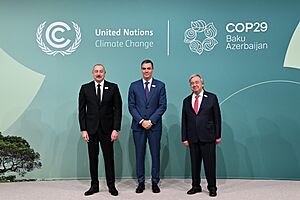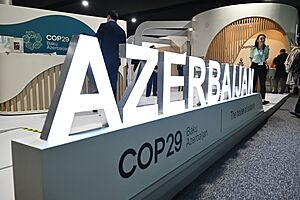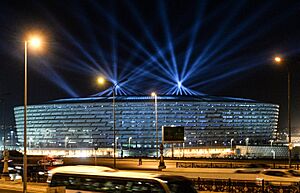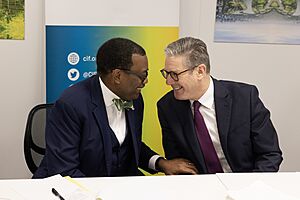2024 United Nations Climate Change Conference facts for kids
 |
|
| Native name | Birləşmiş Millətlər Təşkilatının İqlim Dəyişikliyi Konfransı (2024) |
|---|---|
| Date | 11–22 November |
| Location | Baku Olympic Stadium, Baku, Azerbaijan |
| Organised by | Azerbaijan |
| Participants | UNFCCC member countries |
| President | Mukhtar Babayev |
| Previous event | ← Dubai 2023 |
| Next event | → Belém 2025 |
The 2024 United Nations Climate Change Conference, also known as COP29, was a big meeting about climate change. It was the 29th time the United Nations held this important conference. It took place at the Baku Olympic Stadium in Baku, Azerbaijan. The conference ran from November 11 to November 22, 2024. Mukhtar Babayev led the meeting.
At the end of COP29, countries agreed on plans to help pay for actions against climate change. They also agreed to help developing nations switch to cleaner, more sustainable energy. New rules were set up for countries to trade carbon credits, which are like permits to release carbon. A UN record system was also created for these trades.
Choosing Azerbaijan as the host country caused some debate. This was because Azerbaijan is a major producer of oil and gas. Also, some people had concerns about the country's human rights record and fairness in government.
Contents
Why Azerbaijan Hosted COP29
In December 2023, Azerbaijan was chosen to host the conference. The COP summit moves to different regions each year. It was Eastern Europe's turn to host the 2024 event. Countries in Eastern Europe agreed to support Azerbaijan's offer to host.
Azerbaijan had signed the Paris Agreement in 2016. This agreement is a big plan within the United Nations Framework Convention on Climate Change (UNFCCC) to fight climate change. Azerbaijan officially joined the agreement in 2017.
In January 2024, Mukhtar Babayev was named the president of COP29. He had worked for a long time at Azerbaijan's state-owned oil company, SOCAR. He was also the Minister of Ecology and Natural Resources.
Concerns About the Location
Many people questioned the choice of Azerbaijan as the host. They pointed out that Azerbaijan is a big producer of fossil fuels. Critics also mentioned concerns about human rights in the country. Some felt that hosting the conference there might make the country look better without making real changes. This is sometimes called "greenwashing."
Concerns were also raised about how journalists and environmental activists were treated before the conference. Some believed this showed a lack of free speech. Climate activist Greta Thunberg protested Azerbaijan hosting COP29. She called it "absurd" to hold climate talks in an "authoritarian petrostate."

Amnesty International, a group that works for human rights, said that agreements for the conference should protect human rights. They wanted these agreements to be made public. Azerbaijan's President, Ilham Aliyev, said the criticism was unfair. He stated it would not stop them from working on climate change.
Preparing for COP29
Before the main conference, leaders met to discuss important topics. At a meeting in Bonn in June 2024, they talked about new goals for climate finance. They also discussed how to put parts of the Paris Agreement into action.
In July 2024, Azerbaijan announced a new fund called the Climate Finance Action Fund (CFAF). This fund aimed to get money from countries and companies that produce fossil fuels. The money would then be used for renewable energy and climate projects in developing countries.
In October, Azerbaijan hosted a meeting called Pre-COP. This meeting helped set the stage for the main COP29 talks. Leaders discussed the need for new goals for climate finance. They also talked about fully starting the Loss and Damage Fund. This fund helps countries that are most affected by climate disasters. Discussions also covered how countries could update their plans to reduce emissions.
How COP29 Was Organized
The team that organized COP29 was set up by the President of Azerbaijan in January 2024. Samir Nuriyev, who leads the Presidential Administration of Azerbaijan, was in charge of this committee. The committee had 56 members, including government ministers.
At first, the organizing committee had only men. After some people pointed this out, more men and eleven women were added to the team.
COP29 Leadership Team
Mukhtar Babayev, Azerbaijan's Minister of Ecology and Natural Resources, was the President of COP29. He had previously worked as a Vice President for ecology at the state-owned oil company SOCAR. Other key members of the COP29 leadership team included Yalchin Rafiyev, Elnur Soltanov, Narmin Jarchalova, Nigar Arpadarai, and Leyla Hasanova.
What COP29 Aimed to Do
COP29 focused on finding more ways to limit global warming to 1.5°C. This means keeping the Earth's temperature from rising too much. The leaders stressed that more money was urgently needed for climate action. They also wanted to make sure the Loss and Damage Fund was working well. This fund helps countries that are most vulnerable to climate change, like small island nations.
The conference also pushed for countries to update their plans to reduce emissions by 2025. These plans should focus on reducing the use of fossil fuels and increasing renewable energy. They also aimed to address other harmful emissions like methane. On the topic of adapting to climate change, the leaders asked all countries to create their own adaptation plans by 2025. They also wanted to increase funding for these efforts.
COP29 encouraged banks and private companies to invest more in climate action. The summit aimed to bring businesses together to support climate solutions.
Where the Conference Took Place
The Baku Olympic Stadium was chosen as the main place for COP29. A large area of 112,000 square meters was built next to the stadium for the event. About 80,000 people were expected to attend, including government officials.
COP29 had two main areas. The Blue Zone was for official talks between government groups and international organizations. Countries had their own displays there to show their climate efforts. The Green Zone was open to the public. It was like a fair where companies showed off products and services related to climate.
Money for Climate Action

Climate finance was a very important topic at COP29. The goal was to find more money to help developing countries deal with climate impacts. This money would also help them switch to cleaner energy. A key discussion was about setting a new financial goal for climate action after 2025. This new goal would build on the previous promise of $100 billion each year.
One idea discussed was "blended finance." This combines money from governments and private companies to fund climate projects. Another idea was "debt-for-nature swaps." This allows countries to use money they owe to fund environmental projects instead.
Many banks and organizations promised more money for climate efforts. For example, the World Bank and the European Investment Bank said they would lend $120 billion each year to lower and middle-income countries. The Asian Development Bank also announced new investments.
At the conference, world leaders agreed on rules for trading carbon credits. This decision is expected to bring billions of dollars for climate finance, especially for developing countries.
Countries also reached an agreement for developed nations to promise $300 billion each year by 2035. This money would help developing countries fight emissions and climate disasters. However, some poorer nations felt this amount was not enough. They wanted at least $500 billion. While it was seen as a small step, some critics felt it was not enough, especially because it did not require contributions from all wealthier countries.
Moving Towards Cleaner Energy
COP29 also focused on speeding up the shift away from fossil fuels. A big goal was to set clear timelines for stopping the use of coal. They also aimed to develop markets for green hydrogen, which is a clean energy source. These steps are very important for reaching the goals of the Paris Agreement.
The conference also looked at how to make sure countries have enough energy. This is especially important for countries that rely heavily on fossil fuels. COP29 supported plans that would help these communities make a fair and smooth change to cleaner energy.
To help with these changes, COP29 aimed to create ways for countries to share technology and knowledge. This includes connecting renewable energy grids across regions. This can help more people get clean energy and reduce pollution. By doing these things, COP29 hoped to create sustainable and strong energy systems for the future.
See also
 In Spanish: Conferencia de las Naciones Unidas sobre el Cambio Climático de 2024 para niños
In Spanish: Conferencia de las Naciones Unidas sobre el Cambio Climático de 2024 para niños
- 2024 in climate change
- Climate change in Azerbaijan
 | William M. Jackson |
 | Juan E. Gilbert |
 | Neil deGrasse Tyson |






